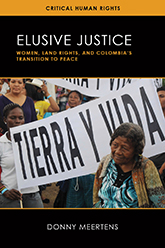|
Elusive Justice
Women, Land Rights, and Colombia's Transition to Peace
Donny Meertens
Critical Human Rights
Scott Straus and Tyrell Haberkorn, Series Editors; Steve J. Stern, Editor Emeritus
“Addresses the critical question of gender and land in postconflict societies by examining women’s access to land through restitution programs in Colombia. Elusive Justice fills a critical gap in the literature using fine-grained ethnographic insights from two case studies from the Caribbean Coast of northern Colombia.”
—Winifred Tate, Colby College
Fifty years of violence perpetrated by guerrillas, paramilitaries, and official armed forces in Colombia displaced more than six million people. In 2011, as part of a larger transitional justice process, the Colombian government approved a law that would restore land rights for those who lost their homes during the conflicts. However, this restitution process lacked appropriate provisions for rural women beyond granting them a formal property title.
Drawing on decades of research, Elusive Justice demonstrates how these women continue to face numerous adverse circumstances, including geographical isolation, encroaching capitalist enterprises, and a dearth of social and institutional support. Donny Meertens contends that women’s advocacy organizations must have a prominent role in overseeing these transitional policies in order to create a more just society. By bringing together the underresearched topic of property repayment and the pursuit of gender justice in peacebuilding, these findings have broad significance elsewhere in the world.
Donny Meertens is an associate researcher at the Institute of Human Rights and Peacebuilding Alfredo Vázquez Carrizosa at Pontificia Universidad Javeriana and cofounder of the School of Gender Studies at the National University of Colombia. She is the coauthor of Bandits, Peasants, and Politics: The Case of “La Violencia” in Colombia and the coeditor of Colombia from the Inside: Perspectives on Drugs, War and Peace.
Praise
“Aims to determine whether the restitution process has been effective in restoring land rights and rural livelihoods or not, and, if not, why not. This is a pathbreaking book on a big, important subject and may well become a classic.”
—Catherine LeGrand, McGill University
|

Larger images
November 2019
LC: 2019008134 HD
224 pp. 6 x 9
3 maps, 2 figs., 1 b/w photo, 4 tables
|

